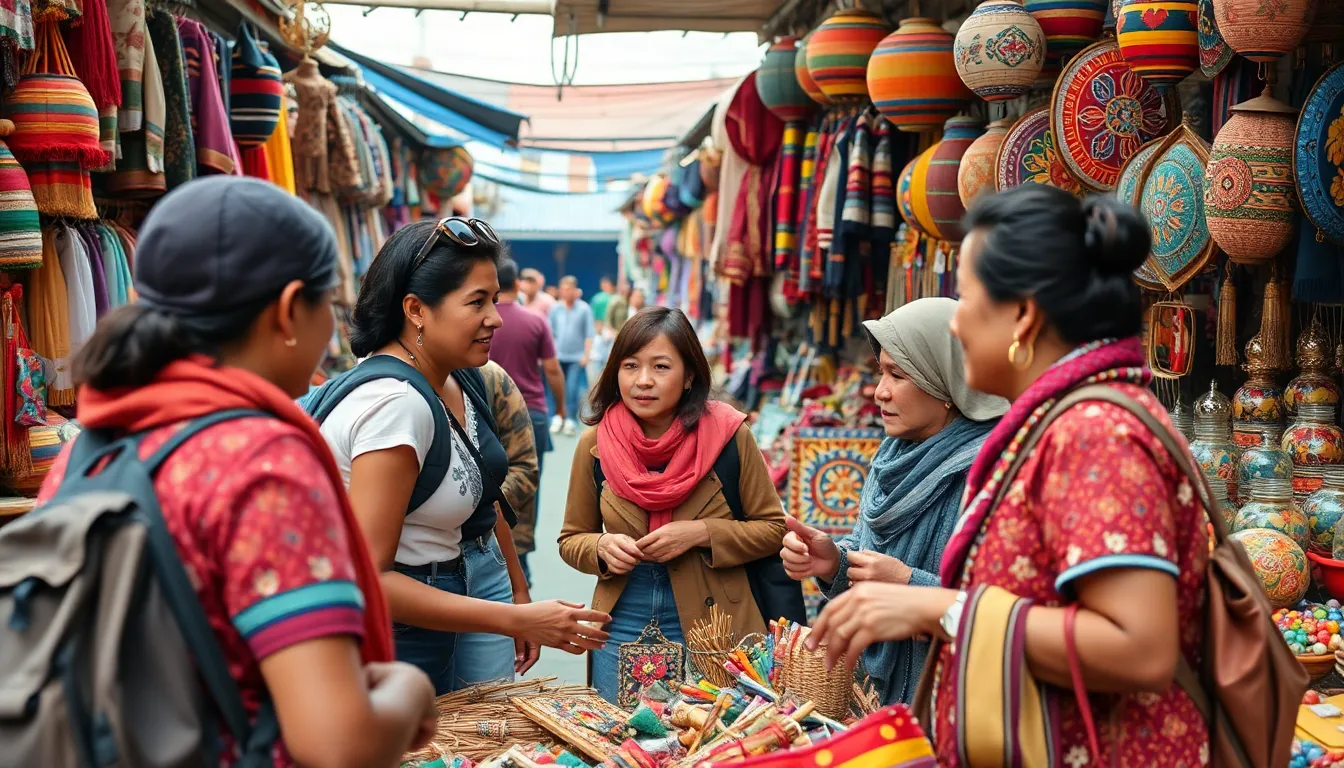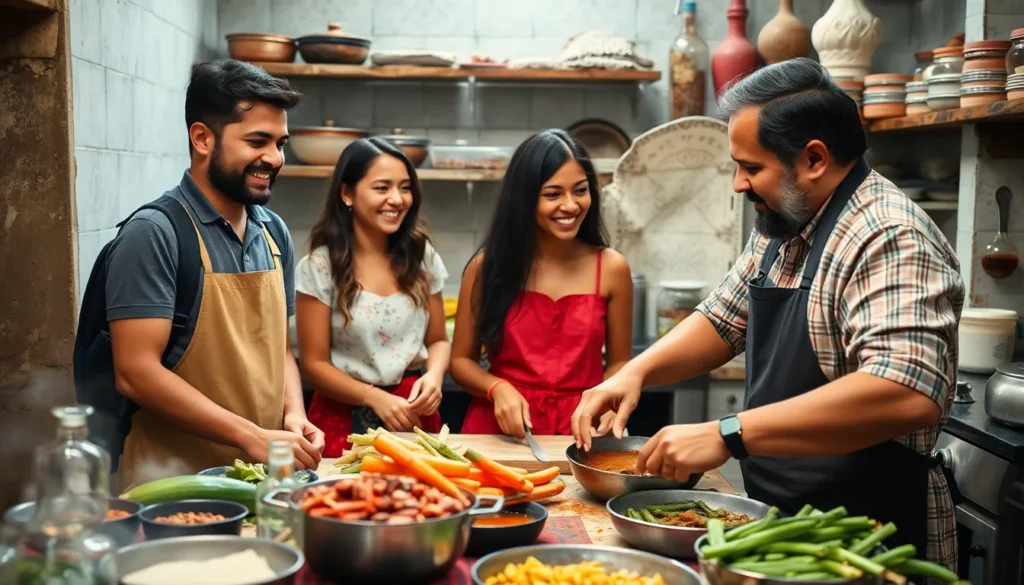Table of Contents
ToggleCultural journeys offer a unique way to explore the world, allowing travelers to immerse themselves in the rich traditions and histories of diverse communities. These experiences go beyond mere sightseeing; they provide an opportunity to connect with locals, taste authentic cuisines, and participate in age-old customs.
As people seek deeper connections during their travels, cultural journeys have become increasingly popular. They inspire curiosity and foster understanding, bridging gaps between different ways of life. Whether wandering through ancient ruins or participating in vibrant festivals, these adventures enrich the soul and broaden perspectives, making every trip unforgettable.
Overview Of Cultural Journeys
Cultural journeys immerse travelers in the rich traditions and histories of diverse communities. These experiences extend beyond traditional tourism, emphasizing genuine interactions with locals and participation in their customs. Travelers engage with the culture through authentic cuisines, traditional arts, and historical narratives.
Popularity for cultural journeys has surged as travelers seek meaningful connections. Over 65% of tourists express a desire for immersive experiences that foster understanding between different cultures. Such journeys cultivate curiosity and respect while offering deeper insights into varied lifestyles.
Each cultural journey serves as an opportunity to broaden perspectives and create lasting memories. Participants frequently cite unique interactions with local artisans, chefs, and families as highlights of their trips. Engaging in traditional events, such as festivals and ceremonies, further enhances the experience, allowing travelers to witness firsthand the vibrancy of different cultures.
Ultimately, cultural journeys enrich travel experiences by connecting individuals with the essence of communities they visit.
Importance Of Cultural Journeys

Cultural journeys hold significant value in today’s travel landscape, promoting deeper understanding and appreciation of diverse communities. These experiences not only enhance individual growth but also contribute to global harmony.
Broadening Perspectives
Cultural journeys expand travelers’ worldviews. Encountering diverse traditions and lifestyles encourages greater empathy and awareness. For instance, engaging in local customs provides insights into daily routines and values that differ from one’s own. Exposure to various art forms, languages, and practices enriches knowledge, allowing individuals to appreciate the complexity of human experience. By embracing diversity through these journeys, travelers often find inspiration that shapes their values and outlook on life.
Fostering Global Connections
Cultural journeys foster meaningful connections between individuals from different backgrounds. Direct interactions with locals promote dialogue and understanding, breaking down stereotypes. When travelers share meals with families or participate in community events, they create lasting relationships rooted in mutual respect. Post-trip relationships often lead to ongoing exchanges, further strengthening cross-cultural ties. These connections contribute to a more inclusive global community, highlighting the importance of human relationships and shared experiences.
Types Of Cultural Journeys
Cultural journeys encompass various experiences that enrich travelers’ understanding of different societies. Each journey type offers unique insights, promoting deeper connections and appreciation of diverse histories and practices.
Historical Tours
Historical tours provide immersive insights into past events that shaped cultures. Participants explore ancient ruins, historic landmarks, and museums, guided by knowledgeable locals who share stories. Engaging with local historians, visitors gain context about cultural significance, allowing them to appreciate the legacy of civilizations. Popular destinations include Rome’s Colosseum and Egypt’s Pyramids of Giza, where understanding history fosters respect for cultural heritage.
Culinary Experiences
Culinary experiences immerse travelers in local gastronomy. Participants often take cooking classes, visit markets, and dine with local families, discovering traditional recipes and cooking techniques. Engaging with chefs or food artisans enhances understanding of regional flavors and ingredients. Travelers may enjoy street food in Bangkok or savor homemade pasta in Italy, creating memorable interactions centered around food that highlight cultural identity.
Artistic Exploration
Artistic exploration focuses on local art forms, including painting, music, and dance. Travelers attend workshops or performances, often led by local artists who share their creative processes. Immersing in regional art enables a deeper appreciation of cultural expressions and social issues they reflect. Visiting local galleries in Paris or participating in traditional dances in Bali exemplifies how art journey fosters connection through shared creativity and cultural narratives.
Planning Your Cultural Journey
Planning a cultural journey involves careful consideration and preparation. Travelers can maximize their experience by researching destinations and preparing for cultural etiquette.
Researching Destinations
Exploring potential destinations ranks high in importance for cultural journeys. Travelers should examine local traditions, historical significance, and customs unique to each location. Resources such as travel blogs, cultural websites, and local tourism boards provide valuable information. Understanding key festivals, regional cuisines, and art scenes enhances the authenticity of the journey. Engaging with locals online through social media or forums can offer firsthand insights and recommendations. Choosing destinations with vibrant cultural scenes fosters deeper connections during the visit, enriching the overall travel experience.
Preparing For Cultural Etiquette
Knowledge of cultural etiquette enhances interactions with locals and fosters respect. Travelers should familiarize themselves with customary greetings, dress codes, and dining practices before arrival. Different cultures may have specific protocols regarding conversation topics and personal space. For instance, in some regions, removing shoes before entering homes is essential, while in others, punctuality holds great significance. Adapting to these cultural norms demonstrates consideration and willingness to engage respectfully. Attending workshops or reading guides about local customs prepares travelers for unique experiences, promoting positive interactions with hosts and communities.
Cultural journeys offer travelers a unique opportunity to immerse themselves in the rich tapestry of diverse communities. By engaging with locals and participating in traditional customs, individuals can foster genuine connections that transcend geographical boundaries. These experiences not only enhance personal growth but also promote empathy and understanding among different cultures.
As travelers seek more meaningful adventures, cultural journeys stand out as a way to enrich their experiences. They provide a platform for breaking down stereotypes and building lasting relationships rooted in mutual respect. With careful planning and an open mind, anyone can embark on a transformative journey that deepens their appreciation for the world’s vibrant cultures.







